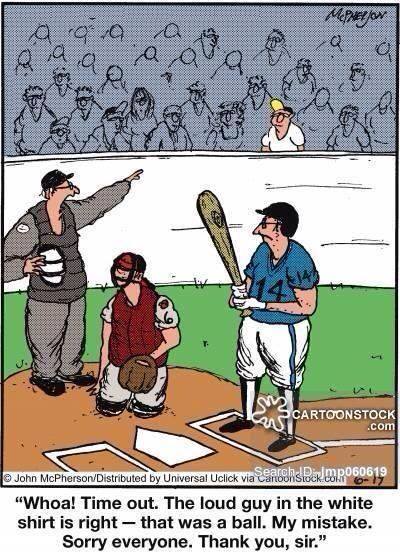Coaches will sometimes tell our assigners that they feel some umpires are no longer willing to listen to their concerns. Perhaps we lost a piece of the puzzle when the rule changed to warn coaches when they questioned judgment. There is a difference when a coach is constantly questioning your strike zone, or your judgment on the bases. There are times when a coach or player can ask you to go for help on a call; examples checked swing, pulled foot and pick-off. These are easy, but it is the game management piece that is hard to define. Do you go into the game knowing that at some point you might be questioned about a call or non-call? Are you confident in your rule knowledge and mechanics so you are prepared to answer the coach in a respectful manner? Are you willing to listen to appropriate questions and then decide if it really needs a warning or is a warning automatic? We need to do a better job of making that decision.
The art of umpiring includes decision-making skills that should also include listening skills. Don’t be afraid to answer questions. Answer all reasonable questions with reasonable answers. Lets work together to create a positive atmosphere for the good of the student athlete.”

Listening to coaches
Successful umpires are approachable and are good listeners. They recognize that they have two ears and one mouth and use them in that proportion. Here is something to consider as you reflect on your game management skills – umpires who are perceived by a coach as being unapproachable might be unapproachable. Coaches have a lot of responsibilities during the game, not only managing the players but also thinking about strategy and substitutions, reacting to what the opponent is doing, etc. So, they are not always 100% certain what an umpire has called. So, a shouted “what was that call” may not be a complaint, it may be an actual question.
Coach initiates a conversation
Let him/her talk, and do not interrupt. Have the courtesy to listen before you say anything. You may have made up your mind and decides there is no way you are changing anything, but by fully listening to what the coach has to say, you can at least empathize with the coach’s viewpoint. Your body language is important as well. See the article on this Locker Room website that discusses non-verbal communications.
When it is your turn to talk, repeating what the coach said indicates that you heard him/her and you understood the message. It also gives the coach a moment to calm down. There are situations when you will not get a chance to talk because the coach will be screaming non-stop. In those cases, you should decide what amount and type of grief you will accept and where to draw the line. When somebody shouts at you, the natural inclination is to holler back. Understand you are not obligated to deliver a reply. It takes a firm resolve to pause deliberately and react in a calm and professional manner.
Possible responses
Here are some responses which might help in convincing the coach that you are approachable and willing to listen to reasonable questions.
• How can I help you coach?
• Coach, I heard what you said; may I now tell you what I saw on this play?
• You may be right; let me keep an eye on that.
• I did not see it that way, but I will be watching for what you think you saw.
Validate the coach’s comments by showing you are listening. A suggested response is, “Coach, it if happened the way you say it did, I missed it.” That will not work multiple times, however. If you are missing too much, it is time to examine your mechanics and positioning.
Coaches may still be unhappy with the call, but at least they will know their concerns are being heard. Inviting questions indicates your willingness to obtain feedback. If constant chirping about your judgment occurs, take a private inventory of your decisions instead of slipping into the natural feeling of defensiveness. Are you missing low pitches? Are you getting into the right position to see the entire play? Were you anticipating the call before the play actually happens? Maybe a valid message is being delivered and you are not receptive. That does not mean you must always question your own judgment when someone else does. Rather, avoid rationalizing and make a candid assessment.
There will be times when a coach genuinely wants to argue, complain, vent or otherwise blow a gasket. How we react to those situations will vary. But before you can come to any decision, we have to listen. Without listening, we cannot understand what is being communicated to us.
